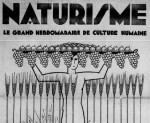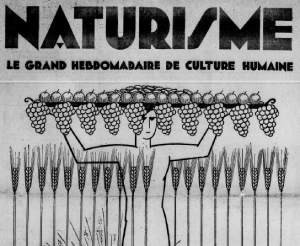
 Revue Naturisme, 1930.
Revue Naturisme, 1930.
In 2017, voted by the Mairie of Paris on a proposal from Ecologie les Verts councillors some months earlier, a naturist space was open at the Bois de Vincennes by way of experiment. Introduced in the summer of 2017, it was repeated in 2018 then 2019. Such decisions testify to the relevance of the political issues, local in this instance, underpinned by the practice of naturism, defined as an environmentally friendly lifestyle based on collective nudity. With this decision, the City of Paris privileged freedom, open-mindedness, recreation and, of course, attention to our natural environment. To leave it at that would however be overlooking the overriding concern that has, for some two centuries, brought advocates of naturism together, kindling politicians’ interest for it as a matter of public health.
The invention of naturism in France belongs to the medical realm. Placing one’s trust in nature, in the organism’s curative powers, thus observing Hippocrates’ “wise” counsel, such is naturist medicine’s foundation as stated at the end of the 18th century. Under the successive guises of therapy, hygiene, lifestyle and recreation, naturism remains at its core an ongoing concern with health, which finds its latest expression in the notion of wellness.
This interest attests to the fears and anxieties, especially body-related, brought out by modernity’s upheavals. Alongside urbanisation and industrialisation, the environmental crisis, the deep sentiment of a final breach between humans and nature fuel nightmares of decadence, of humankind’s degeneracy, both physical and moral. This is felt by a growing number of people in search of identity markers at a time when, what with “history’s acceleration”, certainties are shaken. This has precipitated a shift from medical naturism to life reform movements; structured and militant, they are quick to take on public authorities and industrial lobbies to fight e.g., alcohol, sugar, meat-eating etc… These movements also advocate a reworking of social relations.
In Germanic countries, in the late 19th century, then in France in the early 20th, this resulted in the creation of naturist centres, structured, equipped with grounds where a collective return to nature got under way founded in the practice of water, air, light baths in greater or lesser state of undress, in physical exercise and a broadly vegetarian diet. At the same time, naturism was infiltrating political structures and programmes, viz. the Parti social de la Santé Publique founded by J. Godard in 1929.
The crusade naturists lead against “social scourges” – and for Eugenics – was also driven by a quest for social and political recognition, for legitimacy. And it did earn them the attention of public authorities both at national and local levels. Officials in the ministries for public health, sport and physical education, particularly between the 20s and the 50s, supported some naturist initiatives, officiated at the opening of sport facilities in important centres. Naturism thus made headways in politics as well as in education through the teaching of physical education, hygiene – and also through teacher training. The sporting arena, also solicited for health policies, is a channel of choice for the dissemination of naturist theories and practices. The endorsement of the Fédération française de Naturisme created in 1950, was granted in 1983 by the Ministère du temps libre de la jeunesse et des sports, thus confirming an ongoing sporting commitment, achieved with the wide access to health for the many.
The progress of naturism also bespeaks the populace’s sharp reaction to the muzzling of traditional medicine by the medical establishment in favour of knowledge-based medicine. It epitomises the demand for a democratised health care. In the case of naturist medicine, it is manifest in its remedies, mistrust of chemical medicines and vaccinations, the dissociation of its professional body from the medical establishment but also in its devising a healing process founded in co-construction between doctors and would-be healers, between doctors and patients. The upshot is that this evolution takes it, in the course of the 20th century, from the realm of official medicine to that of alternative or complementary medicines. In a later and significant development, in April 2017, a formation course for naturopathic advisor, naturist medicine’s latest avatar, figures in the Répertoire national des certifications professionnelles (RNCP). Such a decision returns its legitimacy to the professional practice of s0-called natural medicine.
Read more in the dictionary : Stomach - Sugar - Obesity
Read the paper in French :Naturisme
Références :
Arnaud Baubérot, Histoire du naturisme. Le mythe du retour à la nature, PUR, 2004.
Sylvain Villaret, Histoire du naturisme en France depuis le Siècle des Lumières, Vuibert, 2005.
To quote this paper : Sylvain Villaret, "Naturism" in Hervé Guillemain (ed.), DicoPolHiS, Le Mans Université, 2022.